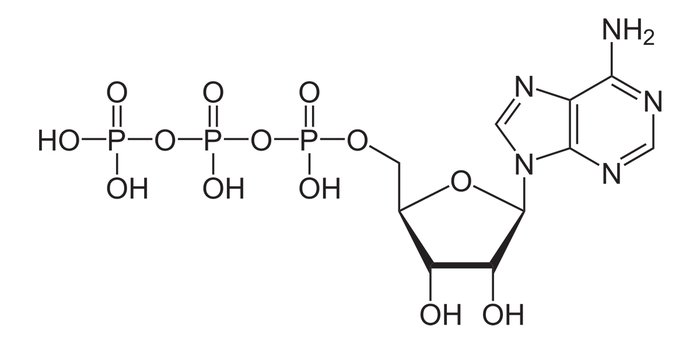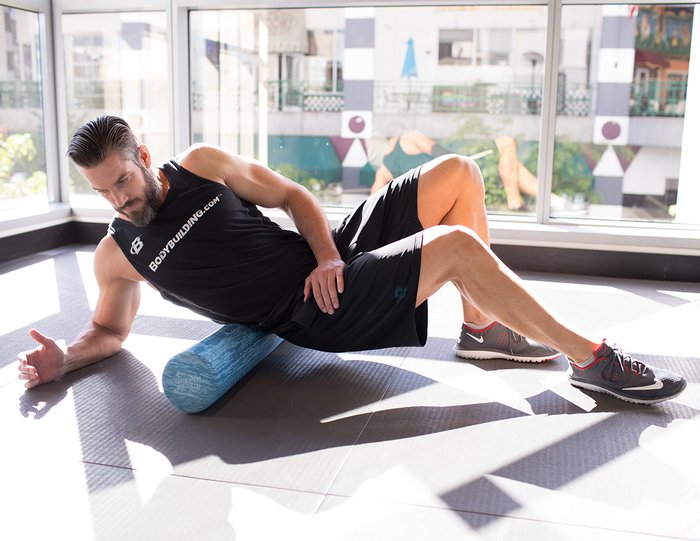Adenosine triphosphate, or ATP, is the main energy source that keeps our bodies alive. In fact, if your body isn't constantly producing it, you're...well...you're clinically dead.
ATP has long been thought of as a chemical the body creates from other nutrients, not a substance that can be taken as a supplement. But taking ATP pills or powders could benefit your workouts.
What Is ATP?
ATP has three phosphate groups (tri-phosphate) in each molecule. When these groups are removed from the molecule, a huge amount of energy is released. Your body uses the energy to carry out a number of critical processes. These include the transportation of protein and lipids (fat) into and out of your cells, communication between cells, DNA and RNA synthesis, and—last, but not least—the muscle contractions that make movement possible.

How ATP Works to Give You Energy
As you use your muscles, your body creates new ATP to keep up with energy demand. But muscle tissue can only store enough of it to last a couple seconds. When you're working your muscles hard, you use up all that energy very quickly, so your body turns to phosphocreatine, glucose, and oxygen to help replenish ATP.
Some people take a creatine supplement to provide energy for short-duration, high-intensity exercise performance. Creatine provides this energy by increasing the supply of phosphocreatine (PCr), which your body can then use to form more ATP. Consuming carbohydrates before a workout works in a similar way. By consuming carbs, you increase your blood glucose levels, which can also be used to produce more ATP during a process called glycolysis.
Benefits of ATP Supplements
Wouldn't it make more sense to just cut out the middle man and take ATP supplements? Yes, and no. Some studies point to beneficial effects—as long as you're a lab rat.[1] Follow-up studies using human participants haven't been as promising.[2,3] But that's not the end of the story. ATP supplements may not directly increase the amount of the chemical in your muscle tissue, but they can improve blood flow to active tissue, boost your physical performance, and speed up recovery.
Improve Strength and Endurance
A 2004 study published in Medicine and Science in Sports and Medicine found that while two weeks of supplementation didn't increase the amount of ATP in muscle tissue, it did enable study subjects to complete more bench-press repetitions at 70 percent 1RM that the group that took placebos.[4]

A study published in the Journal of the International Society of Sports Nutrition showed that 400 milligrams of ATP taken for 15 days in a row reduced muscle fatigue and helped participants exert more power for longer during intensive exercise, when compared to the control group.[5]
Researchers at of The University of Tampa found that 400 milligrams of ATP, combined with 12 weeks of resistance training, enabled participants to make significant improvements in their 1RM squat and deadlift, when compared to a placebo.[6] The study also showed that participants who took the supplements gained more than twice the quadriceps muscle thickness as those taking a placebo.
Increase Blood Flow
In addition to improving muscle function, ATP supplementation can also increase vasodilation, or the widening of arteries. Wider pipes means that more fuel—more oxygen and glucose—can get to active muscles faster. This vasodilation also helps clear out metabolic waste products like lactate and urea from muscle tissue, and supplies more nutrients to speed muscle repair.[7]
Better Recovery
A 2017 study published in the Journal of the American College of Nutrition found that supplementing with ATP prevented its levels from dropping following intense exercise.[8] Participants who took the supplements also maintained greater power output than placebo takers when both groups performed repeated Wingate tests.

Are There Any Side Effects of ATP Supplementation?
To date, there are no known side effects to taking adenosine triphosphate, although the longest study to date was only 12 weeks long. The effects of sustained use have not been studied.
What About Interactions With Other Supplements?
It appears to be safe to combine ATP with other supplements. If there are any effects that all, they are most likely positive ones, enhancing the benefits you get from supplements such as creatine and beta-alanine.
How Much ATP Should You Take, and What Forms Are There?
ATP supplements usually come in pill form, although some multi-ingredient powders contain it. Health experts often suggest that creatine monohydrate is best if you want to increase ATP levels during exercise.
The key is to make sure you are getting 400 milligrams of ATP to maximize any potential benefit.
When Should You Take ATP?
There have yet to be definitive studies on the best times and amounts of ATP supplementation. Existing research suggests that taking 400 milligrams of ATP 30 minutes before exercising works best. On non-training days, take it on an empty stomach 30 minutes before your first meal.
References
- Kichenin, K., & Seman, M. (2000). Chronic oral administration of ATP modulates nucleoside transport and purine metabolism in rats. Journal of Pharmacology and Experimental Therapeutics, 294(1), 126-133.
- Coolen, E. J., Arts, I. C., Bekers, O., Vervaet, C., Bast, A., & Dagnelie, P. C. (2011). Oral bioavailability of ATP after prolonged administration. British Journal of Nutrition, 105(3), 357-366.
- Arts, I. C., Coolen, E. J., Bours, M. J., Huyghebaert, N., Stuart, M. A. C., Bast, A., & Dagnelie, P. C. (2012). Adenosine 5-triphosphate (ATP) supplements are not orally bioavailable: a randomized, placebo-controlled cross-over trial in healthy humans. Journal of the International Society of Sports Nutrition, 9(1), 16.
- Jordan, A. N., Jurca, R., Abraham, E. H., Salikhova, A., Mann, J. K., Morss, G. M., ... & Earnest, C. P. (2004). Effects of oral ATP supplementation on anaerobic power and muscular strength. Medicine and Science in Sports and Exercise, 36(6), 983-990.
- Rathmacher, J. A., Fuller, J. C., Baier, S. M., Abumrad, N. N., Angus, H. F., & Sharp, R. L. (2012). Adenosine-5-triphosphate (ATP) supplementation improves low peak muscle torque and torque fatigue during repeated high intensity exercise sets. Journal of the International Society of Sports Nutrition, 9(1), 48.
- Wilson, J. M., Joy, J. M., Lowery, R. P., Roberts, M. D., Lockwood, C. M., Manninen, A. H., ... & Rathmacher, J. A. (2013). Effects of oral adenosine-5′-triphosphate supplementation on athletic performance, skeletal muscle hypertrophy and recovery in resistance-trained men. Nutrition & Metabolism, 10(1), 57.
- Jäger, R., Roberts, M. D., Lowery, R. P., Joy, J. M., Cruthirds, C. L., Lockwood, C. M., ... & Wilson, J. M. (2014). Oral adenosine-5-triphosphate (ATP) administration increases blood flow following exercise in animals and humans. Journal of the International Society of Sports Nutrition, 11(1), 28.
- Purpura, M., Rathmacher, J. A., Sharp, M. H., Lowery, R. P., Shields, K. A., Partl, J. M., ... & Jäger, R. (2017). Oral Adenosine-5-triphosphate (ATP) Administration Increases Postexercise ATP Levels, Muscle Excitability, and Athletic Performance Following a Repeated Sprint Bout. Journal of the American College of Nutrition, 36(3), 177-183.

